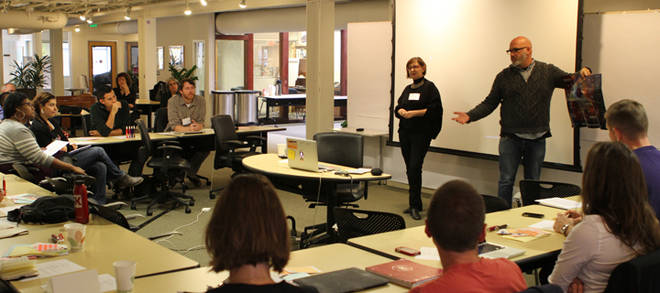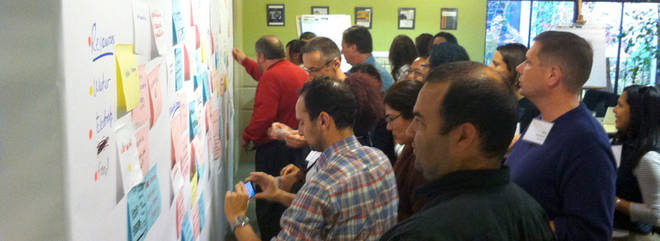Future Now
The IFTF Blog
Knight Fellows Visit The Future
On November 15 the Knight Fellows visited The Institute for the Future for a workshop on the future of media and storytelling. I was lucky enough to participate in this workshop and I can tell you that journalists are a fun group of people.
The Knight Fellowship is a yearlong sabbatical, where journalists come together from all over the world, and immerse themselves in the fast paced and innovative culture of Silicon Valley. The goal is to explore new and innovative ways for journalists to tell their stories.
IFTF's work is particularly relevant here, as we have been studying the future of media since the birth of the Internet. For the past 44 years, IFTF has explored potential futures for new communication tools. Marina Gorbis and David Pescovitz from IFTF shared with us some of the history that lead to a discussion about the state of media and technology today.

At an event in 1972 where the ARPANet was introduced, Bob Johansen was presenting on behalf of IFTF about the early use of the net for surveys and to connect scientists. An impassioned computer scientist stood up and said, to paraphrase, "the use of the ARPANet for person-to-person communication is a mis-use of CPU." That scientist was almost right in a way, in that the ARPANet was designed for data communications, not people-to-peopleToday, most people spend their time on the Internet on social networking sites, and primarily they use it to communicate with friends, family, and strangers. And these interactions are changing the face of the world, for better or for worse.
As a group, everyone discussed a variety of new tools that can be used for journalism; ranging from the Internet of things or data-driven content creation, to sonification of information or augmented reality. Could these new tools be creating a culture of digital distraction, where no one can pay attention? Are they augmenting our abilities as human beings and leading us down paths affecting our future evolution? As the group discussed the finer points on both sides of this argument, Jake Dunagan, a researcher here at IFTF, chimed in, "I'm with Socrates. I think the written word has destroyed our memory.” Perhaps we are more married to our technology and our words than we think. It is possible that we are evolving in unimaginable ways, but don’t know it yet. Latoya, a Knight Fellow, said, "Our brains are literally rewiring. We could look at it as a loss, or we could look at it as an adaptation."
Throughout all of this, a constant we have is the human narrative — our story. It is a journalist’s duty to tell this story in whichever medium is most appropriate for the time. In this workshop, we explored new mediums through which journalists could tell the story of mankind.
To find the best medium for a story, you first choose a subject, so we decided to explore the concept of Urgent Futures. The events that can change the face of the world overnight, these are the Black Swan events that we don’t see coming, and this is what we focused on.

Everyone in the room was asked to think of the most urgent scenario that could affect the future. We broke up into groups to look at these opportunities. Anyone could join any group and we were free to move between them. Here at the future we vote with our feet, so after a quick brainstorm session the groups came up with some truly innovative ideas. To summarize a few:
- Reporting on a company index that measures total earnings, taxes paid back to society, worker treatment and compensation, environmental infractions, etc.
- A reputation system, where journalists can call colleagues out for citing false sources, or credit each other for using credible facts.
- A world map that aggregates and sorts all published stories by topic, focusing on climate change stories.
- A climate change drama show for television.
- Mobile news trucks for hyper-local reporting in communities, allows for a focus on citizen journalism.
- New educational techniques: Journalism in the classroom, reports on stories and engages the students.
- Data based school reform, where quantitative data effects educational policies.
- A global map of privacy, showing what the cultural norms are for "privacy" in different areas of the world and within different cultures.
- Privacy stock exchange gives users bargaining rights when sharing or not sharing their information.
These are some truly great ideas. I for one would really like to see some of these become a reality. If anyone can make this happen, it is the Knight Fellows!



